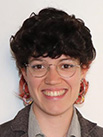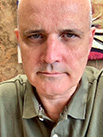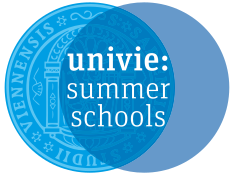
lecturers

Dr. Gabriela Balladares
Consultant for Research and Analytics Solutions, Clarivate
Gabriela Balladares is the consultant for research and analytics solutions at Clarivate for the South of Europe. She is committed to supporting research managers, researchers, and librarians in their analysis of scientific publications output to shape their decision-making based on trusted and reliable data. Gabriela is an expert in bibliometrics, and her interests are focused on research integrity, research intelligence and how technology is changing the way in which research is conducted.

Dr. Nicola De Bellis
Bibliometric Office, University of Modena and Reggio Emilia, Italy
Nicola De Bellis is the coordinator of the Bibliometric Office and an adjunct professor of information science at the University of Modena and Reggio Emilia. He graduated in philosophy and obtained a PhD in the history of science in 1998, with a doctoral dissertation on Renaissance encyclopedias that was later developed into one of the first accounts of the history of citation analysis. Since joining a medical library in 2002, he has worked at the intersection of service-oriented and research-based interests in information science, history and philosophy of science. His work group currently supports research evaluation, open science activities, and gender-related projects at the University of Modena and Reggio Emilia, focusing primarily on advanced quantitative and qualitative analyses and reporting. He also collaborates with the CINECA consortium to develop nationwide bibliometric indicators within a CRIS environment.

Dr. Ángel M. Delgado-Vázquez
Universidad Pablo de Olavide, Spain
Ángel M. Delgado-Vázquez is a specialist in scholarly communication and scientific information management. He holds degrees in Humanities (Universidad Pablo de Olavide) and Library and Information Science (Universitat Oberta de Catalunya), as well as a Master’s in Digital Libraries and Information Services (Universidad Carlos III de Madrid). He currently serves as Head of Learning and Research Support Services at the Library/CRAI of Universidad Pablo de Olavide, where he is also an Associate Professor in the area of Library and Information Science and Academic Coordinator of the Official Master’s Degree in History and Digital Humanities.
With over fifteen years of experience, he has designed and delivered training programs for undergraduate, master’s and doctoral students, as well as academic and research staff, focusing on digital skills, scholarly publishing, and research evaluation. His work includes expert guidance on scientific evaluation and academic publishing for researchers, journal editors, evaluators, and decision-making bodies, particularly in the context of open science and responsible research assessment.
He also directs the university expert diploma Servicios de Apoyo a la Investigación: información, datos, evaluación y publicación científica, aimed at the professional development of those working in the academic information ecosystem. He is a member of the Evaluation and Monitoring Commission of the Spanish national accreditation system (ANECA), where he contributes to the design and improvement of evaluation criteria in the university context.
He is also a member of the coordination group of DialnetCRIS, promoting open infrastructures for research information management, and serves on the evaluation committee for the FECYT Scientific Journal Quality Seal, supporting the improvement of editorial standards and visibility of academic journals in Spain.

Dr. Simone Di Leo
Sapienza University, Italy
Simone Di Leo is an Assistant Professor at Sapienza University of Rome with a focus on quantitative economic analysis. He has a PhD in Industrial and Management Engineering. He is specialized in micro-data analysis and data quality in higher education institutions in Europe. His main research fields are scientometrics, non-parametric analysis and systematic literature reviews.
Personal website: https://simonedileo.github.io/
Google Scholar page: https://scholar.google.com/citations?user=uXEtOBsAAAAJ&hl=it

Dr. Elizabeth Gadd
Loughborough University, UK
Dr Elizabeth (Lizzie) Gadd is Head of Research Culture & Assessment at Loughborough University. She chairs the International Network Of Research Management Societies (INORMS) Research Evaluation Group and is a Vice Chair of the Coalition on Advancing Research Assessment (CoARA). She co-authored the UKRI-commissioned report, ‚Harnessing the Metric Tide: Indicators, Infrastructures & Priorities for UK Research Assessment‘ and was the recipient of the 2020 INORMS Award for Excellence in Research Management and Leadership.

Dr. Elvira González-Salmón
Universidad de Granada, Spain
Elvira González-Salmón is a PhD candidate at Universidad de Granada. She holds a bachelors degree in International Relations (Universidad Complutense de Madrid) and a History of Politics and Society Masters (Utrecht University). They enjoyed a JAE-intro fellowship at the Instituto de Políticas y Bienes Públicos (IPP-CSIC). Her research focuses on gender inequalities within academia and how they affect research agendas. In 2024 they were a visiting scholar at the Delft Institute of Applied Mathematics (Delft University of Technology).

Dr. Jörg Hellwig
Senior Research Analyst, Elsevier
In his role as Senior Research Analyst, Dr. Jörg Hellwig focuses on analyzing the research performance and trends for public agencies and academic institutions. Recent customers for projects include the European Commission, the Dutch Ministry of Economic Affairs and Climate Policy, the Welsh Government, the Indian Department of Biotechnology and the Association of African Universities (AAU). Dr. Hellwig was part of the research team for She Figures 2018, 2021, and 2024.
Prior to that role, he worked as Customer Consultant Research Intelligence in Germany, the Netherlands, South Africa and the UK, responsible for supporting the adoption and use of SciVal, Scopus and various analytical tools and solutions for research performance and planning. Working for more than fifteen years with higher education, corporate, and governmental institutions, he has a thorough knowledge of this sector in various countries. Dr. Hellwig holds a Ph.D. in Chemistry from Georg August University Göttingen in Germany with the subsidiary subject Communication Theory and Publicism. After that, he worked for almost ten years in pharmaceutical companies before he joined Elsevier.

Dr. Victor Herrero-Solana
Universidad de Granada, Spain
Victor Herrero-Solana has served as a Library Science lecturer at the National University of Mar del Plata, National Autonomous University of Mexico (UNAM), El Colegio de México, and the University of Extremadura. He is currently a Professor in the Department of Information and Communication at the University of Granada. He serves as the head of the SCImago-UGR research group (SEJ036) and leads two research projects at regional and national levels. His extensive publication record includes research papers and reports in the fields of data visualization, science mapping analysis, bibliometrics, patentometrics, and media studies.

Dr. Jürgen Wastl
VP Research Evaluation and Global Challenges, Digital Science
Jürgen Wastl is VP Research Evaluation and Global Challenges at Digital Science and brings in his experience from his previous role leading the consultancy team supporting research institutions, funders, governments, and other institutions with research capabilities to make more and better use of data to inform their strategies and decisions.
Before joining Digital Science, he headed the Research Information team at the Research Strategy Office at the University of Cambridge with responsibilities for activities in research evaluation and reporting as well as managing and implementing software tools and research identifiers (e.g. ORCID) for Academics and Administrators and was responsible for the provision and implementation of analysis (including network and collaboration analysis) for Collegiate Cambridge.

Galina Yakshonak
Subject Matter Expert, Elsevier
Galina Yakshonak is a Subject Matter Expert at Elsevier, specializing in research analytics. She supports Elsevier clients worldwide in enhancing the effectiveness of analytical solutions for research development, strategic planning, and performance evaluation. With a career at Elsevier spanning since 2005, Galina has held roles as a Customer Consultant for Eastern Europe, Russia, and CIS countries, as well as in the marketing department. Prior to this, she worked in the Literature Acquisition Department at the Central Science Library of the Belarus Academy of Sciences (2001–2005).
Galina holds a degree in Social Pedagogy and Practical Psychology from the Belarus State Pedagogical University (M. Tank). She further expanded her expertise with a postgraduate degree in Library and Bibliography Sciences from the Belarusian State University of Culture and Arts. Additionally, she completed a Professional Retraining Program at Sechenov University, gaining qualifications in preventive and personalized health management. She has also studied Project Management based on the PMI PMBOK® Standard (PM Expert, PMI® Global R.E.P.).
Galina’s expertise in Elsevier’s analytical tools and her multidisciplinary background enable her to provide comprehensive, well-rounded support, effectively addressing the diverse needs of Elsevier users.
The intelligent use of scientometrics, which is increasingly a must, requires rigorous training in the nooks and cranny of bibliometric methods. The esss is a timely response to this urging need, and the four organisations behind the initiative have demonstrated their professionalism in this field which is a guarantee that summer students will be exposed to sound practice and clever thinking.

